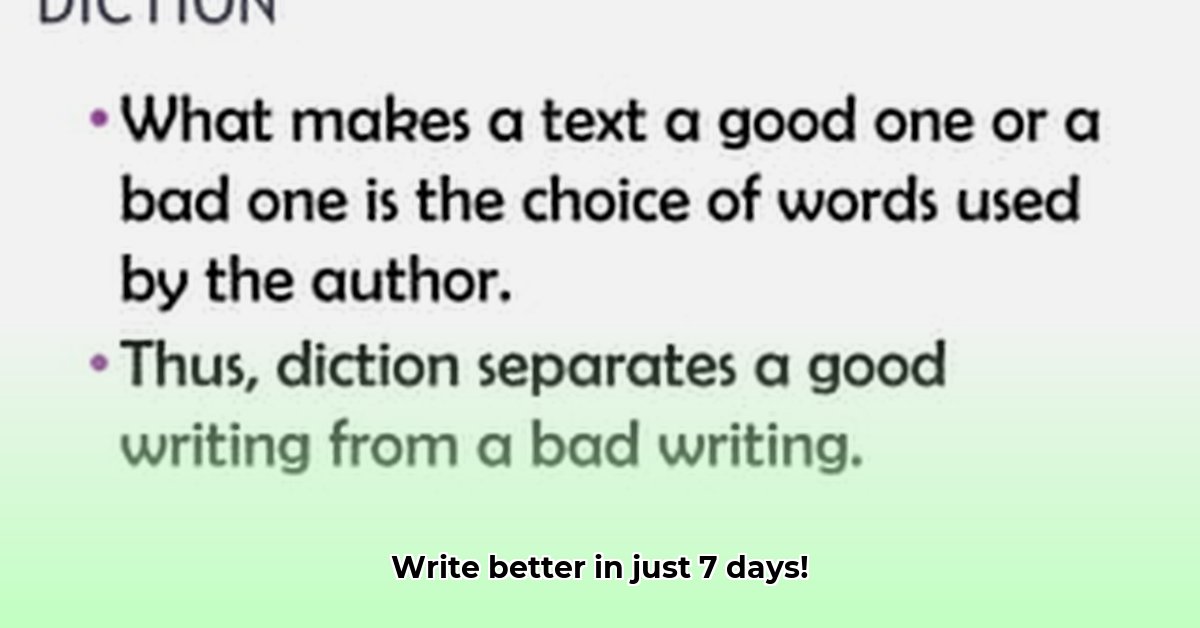
Day 1: Understanding Diction and Its Impact
Diction, simply put, is your word choice. Poor diction—using the wrong words or phrases—can cloud your message, making your writing unclear, unprofessional, and even boring. It's like trying to build a house with mismatched bricks; the structure will be weak and unstable. Mastering good diction is crucial for effective communication in any context, from casual emails to formal reports. Think of it as the foundation of clear and compelling writing. This guide provides a seven-day plan to improve your diction and transform your writing.
Day 2: Identifying Common Diction Errors
Several common pitfalls can hinder clear communication. Let's examine some typical diction errors:
Clichés: Overused phrases like "think outside the box" or "at the end of the day" are predictable and lack impact. They often weaken your writing by relying on tired expressions instead of fresh, original phrasing.
Jargon: Technical terms understood only by specialists create barriers to understanding for a general audience. Unless you're writing specifically for experts, avoid jargon and opt for plain language.
Slang and Informal Language: Using slang (e.g., "gonna," "wanna") or overly casual language in formal writing undermines your credibility and professionalism. Always adapt your language to your audience and the context.
Wordiness: Using more words than necessary obscures your message and makes your writing tedious to read. Strive for conciseness; say what you mean directly and efficiently.
Imprecise Word Choice: Selecting words that are vaguely related to your meaning instead of the most accurate, precise word. For instance, "happy" and "joyful" both denote positive emotions, but one may be more appropriate depending on the context.
Day 3: Elevating Your Word Choice: Strategies for Improvement
Strong diction requires careful attention to word selection. Here's how to improve:
Audience Analysis: Consider your readers. What's their background? What's their level of understanding? Tailor your language to their knowledge and expectations.
Thesaurus Use: Use a thesaurus to find synonyms, but always check the precise meaning of each word. Don't simply substitute a word; choose the one that best conveys your intended nuance.
Strong Verbs and Precise Nouns: Replace weak verbs (e.g., "said," "went," "was") and vague nouns with more powerful and precise options. For instance, instead of "He said something," try "He declared emphatically," or "He whispered a secret."
Eliminating Redundancy: Review your writing for unnecessary words or phrases. Cut them ruthlessly. Every word should serve a purpose.
Day 4: Conciseness: The Art of Saying More with Less
Conciseness is a cornerstone of good diction. Removing unnecessary words and phrases makes your writing clearer and more impactful. Compare these examples:
| Wordy Phrase | Concise Version |
|---|---|
| In the event that it rains | If it rains |
| Due to the fact that he was late | Because he was late |
| At this point in time | Now |
Practicing conciseness will significantly improve your overall diction and communication effectiveness.
Day 5: Proofreading and Seeking Feedback
Proofreading is essential for identifying and correcting diction errors. Read your work aloud to catch awkward phrasing or unclear language. Then, seek feedback from others. A fresh perspective can reveal weaknesses you may have overlooked. This peer review process is invaluable in perfecting your writing.
Day 6: Mastering Different Diction Styles
Formal writing demands precise, sophisticated language; informal writing allows for a more relaxed, conversational tone. Context is everything. A legal document requires a vastly different approach than a personal email.
Day 7: Continued Practice and Refinement
Improving your diction is an ongoing process. Consistent effort and practice are key. Continue to refine your word choices, seek feedback, and strive for clarity and precision in all your writing. With dedication, you'll become a more effective and compelling writer.
Key Takeaways:
- Precision: Choose words that accurately and vividly convey your meaning.
- Clarity: Ensure your writing is easily understood by your intended audience.
- Conciseness: Avoid unnecessary words and phrases.
- Style: Adapt your writing to the context and audience.
- Practice: Consistent writing and feedback are essential to improvement.